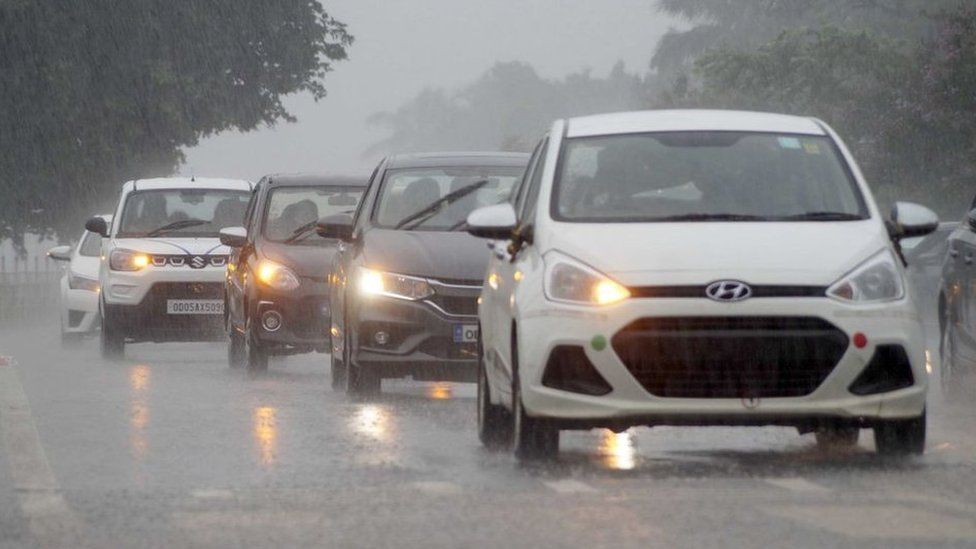India GDP: What car sales reveal about India’s stalling economy
- Published

India's economy has contracted for a second successive quarter, plunging the country into recession. Will improving car sales, a marker of growth, help drive a modest rebound in the near future? Nidhi Rai reports.
Ashwin Arya recently bought a brand new Toyota Glanza for his family. The 30-year-old, who lives in Betuk, a town in Madhya Pradesh state, bought the car in June, when most of India was still shut after the world's longest coronavirus lockdown.
"My father had met with an accident and we desperately needed a car," Mr Arya said.
Mr Arya says the family had planned to buy a new vehicle even before the pandemic struck. But his father's accident hastened the purchase.
"My father has to go to work everyday. My mother and sister also use it for their daily activities. We needed a car for basic mobility as public transport is not good in Betul."
On the back of such buying by customers like Mr Arya, the Indian automobiles sector, which contributes 7% to the country's Gross Domestic Product or GDP, recorded a good month in October. It's a small sign of hope for the Indian economy, which has now recorded two successive quarters of negative growth.
Many economists expect the economy to return to expansion mode as early as the December quarter if the pickup sustains. Some experts say the latest contraction - 7.5% - is still a positive sign, compared to the previous quarter's figure, 23.9%. Their optimism is backed by improving car sales and services sector performance as Covid case numbers fall and the promise of a vaccine grows.
Why are car sales growing?
Retail sales of automobiles in October 2020 were up by 5.1% compared to the previous month, according to Care Ratings. But they were still down by 23.9% compared to last year.
One reason for the slight improvement, experts believe, is pent-up demand. This also coincided with the festive season - the Hindus festivals of Dussehra and Diwali, which spur a lot of buying, account for 35-40% of total sales of the year.
The complete shutdown of public transport during the lockdown also created an urgency for private vehicles, prompting some people to buy them in case of another lockdown. And there are also first-time buyers who probably prefer not to use public transport or ride-hailing apps for fear of catching the virus.
India's festival season did not pause for Covid-19
"I think everyone is concerned with safety and therefore they prefer their own vehicle," says Abhishek Jain, who runs a used car store in Mumbai city.
But, much like other sectors in the economy, the sluggish growth in the auto sector too can't be entirely blamed on the coronavirus.
It has been in a slump since 2019 because of new emission standards, rising fuel charges, higher interest rates on loans and an overall slowdown in the economy.
In the last two years, more than 300 dealerships across the country have shut, according to the Society of Indian Automobile Manufacturers.
So, is the auto sector revving up again?
"I don't know if we are back on our feet - we are looking at things on a month-on-month basis," says Vikram Kirloskar, vice chairman of Toyota Kirloskar Motors, India's fourth-largest car maker.
"Our order book is looking good. But we cannot plan for three months down the line."
It also depends on the overall economy, says Manohar Bhat, vice president of sales and marketing at Kia Motors India. That is, if the economy starts growing again, people feel confident and spend money.
"If people feel rich, they will buy vehicles. So commenting on the future is going to be difficult as we all know that the economy is not doing well and will not do well in the next year," he said.
Although retailers expect pent-up demand from earlier in the year to be spread across the next six months, they are sceptical of any significant uptick.
Experts also agree that the current rebound may be deceptive. And auto makers believe sales are bound to fall steeply next year.
"I am not very hopeful," Vinkesh Gulati, president of the Federation of Automobile Dealers Associations, said.
"Whatever positive [signs] we have seen, they will not continue. January onwards things are not looking good as of now."
- Published17 September 2020
- Published31 August 2020